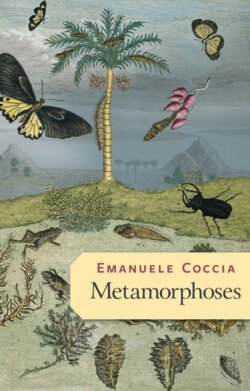Читать книгу Metamorphoses - Emanuele Coccia - Страница 6
Acknowledgements
ОглавлениеI have often been told that the second birth is far less painful than the first. The mother’s body has learned from its past experience and can perform the necessary movements more easily and quickly. I have also often been told that writing a book is a kind of childbirth. My body does not have, and never will have, the ability to carry a child, so I cannot comment on the legitimacy of this comparison or on the second birth. What I do know is that writing a book has always been a painful and unpredictable experience for me. In writing, no accumulation of experience is possible: no knowhow, no mastery. Faced with the book, any book, I am, and always have been, a clumsy dilettante, and I have always felt like a child facing an unknown object with a magical allure, who doesn’t really understand how it works. Faced with this, the closeness of friends with whom I can chat and spend time is the only form of epidural anaesthesia. Frédérique Aït-Touati reread several versions of the book and generously discussed many of the ideas contained herein: my dialogue with her and with her work has been essential, and I want to thank her with all my heart. My dialogue with Bruno Latour has enabled me to progress on many points: I am extremely grateful to him.
This book affirms the unity of all living beings present, future, and past, and the unity of the living being with the matter of the world: this is what has often been called pantheism. Discussions over time with Giorgio Agamben have left a deep impression upon me. Emanuele Dattilo is writing a book on this hidden tradition and its repressed history.
The book could not have been born without all that I was able to learn from conversations woven across time with Adel Abdessemed, Léonore Bancilhon, Marcello Barison, Rocio Berenguer Soldan, Stefano Boeri, Bianca Bondi, Chiara Bottici, Giovanni Careri, Barbara Carnevali, Lucien Castaing-Taylor, Dorothée Charles, Emanuele Clarizio, Gilles Clément, Michela Coccia, Veronica Dari, Laetitia Dosch, Simone Farresin, Donatien Grau, Sabine Guermouche, Camille Henrot, Noreen Khawaja, Sophie Kurkdjian Nadia Yala Kisuki, Mathilde Laurent, Alice Leroy, Fabian Ludueña Romandini, Filippo Mignini, Jeremy Narby, Ernesto Neto, Hans Ulrich Obrist, Verena Paravel, Philippe Parreno, Éric Philippe, Christine Rebet, Massimo Scolaro, Bas Smets, Michele Spanò, Andrea Trimarchi, Éloïse van der Heyden, Chiara Vecchiarelli, Marie Vic, Barbara Vinken, Caterina Zanfi, and Luis Zerbini.
In addition to people, this book has been made possible thanks to the cities where I have had the chance to stay for various periods.
In Paris, during the final months of the writing process, I had the opportunity to collaborate in the organization of an exhibition about trees at the Fondation Cartier: the writing of the book came out of the experience completely transformed. I thank Hervé Chandes for this invitation and for the important discussions I had with him, Pierre-Édouard Couton, Isabelle Gaudefroid, Adeline Pelletier, and Marie Perennes. A striking remark by Bruce Albers on the eighth floor of the Fondation was decisive: I especially thank him.
In Karlsruhe, invited by Bruno Latour to give a lecture, an advance version of the manuscript and three years of work melted in a few drops of coffee. It was one of the most radical and happy rejuvenative experiences of recent years: the book would certainly have been different without this involuntary metamorphosis.
In Monaco, the dialogues opened up with Charlotte Casiraghi, Joseph Cohen, Roger-Pol Droit, Laura Hugo, Robert Maggiori, and Raphael Zaguri-Orly have punctuated my intellectual life for the past three years: I would like to thank them for their generosity and their ability to bring thought everywhere.
In Brussels, Laurent van Eynde allowed me to present a first version of the book, and to discuss it with Natacha Pfeiffer and Maud Hagelstein.
In London, I was able to discuss a few pages of the book with Filipa Ramos, Lucia Pietroiusti, Martin Savranski, and John Tresch.
Many of the ideas in this book were born during a short stay in Wellington made possible by Stéphane Re: meeting him and Alizée Alexandre was very important.
In Curitiba, I was able to present and discuss in detail a first draft with Alexandre Nodari, Juliana Fausta, Juliàn Nowodworski, Marco Antonio Valentim, and Flavia Cera.
In Rio de Janeiro, Anna Dantes, Madeleine Deschamps, Marcus Wagner, and the entire Selvagem team welcomed the ideas in the book with great generosity and passion.
In New York, Phillip Usher, Meriam Korichi, and Omar Berrada helped me move forward with the writing of the book.
By a strange coincidence, I must have written a good part of the text in Weimar, a few hundred metres from the place where Goethe composed his writings on the metamorphosis of plants. I am profoundly grateful to Bernard Siegert and Lorenz Engell for welcoming me to the IKKM, and to Leander Scholz, Elena Vogmann, and Katarzyna Włoszczyńska for the discussions.
I would like to thank my editor, Lidia Breda, who always knows how to alternate between pressure and attentiveness with an art that is hers alone. Renaud Paquette was the first reader of the manuscript: his remarks and suggestions made it possible to considerably improve the text by carrying out the very last metamorphosis of the manuscript. I am extremely grateful to him.
Maria Assunta Tosoni and Michele Coccia, my mother and father, taught me from childhood not to be afraid of any kind of metamorphosis. I thank them for their courage, their freedom, their madness.
I dedicate this book to my daughter Colette. She arrived barely five years ago and she has changed everything around her, and around me: she has lit up the worlds through which she has travelled with a joy and grace I had never before encountered. She knows all the secrets of metamorphosis – and she has revealed a few of them to me.
